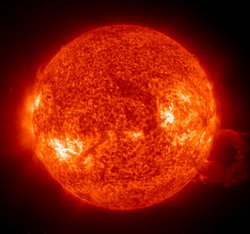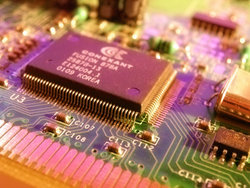Difference between revisions of "Fundamental resources"
(→Human intelligence) |
(→Material) |
||
| Line 3: | Line 3: | ||
== Material == | == Material == | ||
[[Image:Air sea and land.jpg|right|250px|Atmosphere, hydrosphere and lithosphere (a.k.a. air, sea and land)]] | [[Image:Air sea and land.jpg|right|250px|Atmosphere, hydrosphere and lithosphere (a.k.a. air, sea and land)]] | ||
| − | + | [[Most abundant elements on Earth|Air, water and the twenty most abundant elements in the earth's crust]] give us almost all the necessary raw material to create all the machines and goods that mankind requires, such as: | |
*Buildings and construction materials | *Buildings and construction materials | ||
Revision as of 19:33, 8 February 2006
This page aims to show that mankind's four fundamental resources are in fact highly abundant:
Contents
Material
Air, water and the twenty most abundant elements in the earth's crust give us almost all the necessary raw material to create all the machines and goods that mankind requires, such as:
- Buildings and construction materials
- Cars, trains and aircraft
- Industrial machinery
- Robots
- Computers and electronic products
- Food and drinking water
These reserves of material are not going to run out - processing and using up the entire earth's crust would be quite a challenge for even the most wasteful societies. Of course we are not advocating wasteful processes just because material is plentiful; one aspect of technological progress is the increasing efficiency of design and manufacturing - doing more with less.
It should be noted that there are other trace elements required for certain things such as agriculture, but by their nature only correspondingly small amounts of these substances are required.
Recycling is almost certain to become far more widespread than it is now, further reducing the burden of having to process new material for creating goods and infrastructure. Product design will become more sympathetic to the recycling process which will soon become highly automated.
Energy
We have these major sources of energy available to us, in no particular order and not including fossil fuels that we currently rely on for the majority of our energy provision:
- Solar: photovoltaic, solar thermal, solar chimney. Prospective: solar power satellite
- Wind: land-based wind turbine, off-shore wind turbine. Prospective: jet-stream sky windmills
- Ocean: wave, tidal, ocean currents
- Hydro-electric: reservoir-fed, small river water mill
- Nuclear: nuclear fission. Prospective: nuclear fusion and accelerator-driven thorium-based energy amplifier
- Geothermal: shallow geothermal heat pumps, volcanic related geothermal, deep geothermal ('hot-dry-rock')
- Biomass: vegetable oil, compost methane, sustainable wood, burning of organic waste, animal dung and rubbish
These sources of power far exceed our current and likely future energy requirements; as well as improvements in the efficiency of our energy consumption becoming a significant factor in our energy use, due to improved design and increasing cultural awareness. Also having power generation located much more locally to end use would reduce transmission inefficiencies.
Intelligence
Human intelligence
Some people may suggest this as the one fundamental resource that really is in short supply...
We just haven't been using it as efficiently as we could be. Currently with activities such as design and engineering, only relatively small groups of people collaborate in any meaningful way. The development of most things whether they be products, services, utilities or modern agricultural processes tend to be done behind closed doors. This means that compared to what is possible, progress is sporadic and slow. With the involvement of all interested parties and using open and transparent development processes, progress could be far quicker and more efficient. This would also significantly reduce the huge duplication of effort that happens today.
As well as potentially increasing the effectiveness of our current intelligence, total intelligence is growing constantly.
Worldwide education is becoming more pervasive and of better quality, meaning that a larger percentage of the population can effectively participate in developing solutions. The world population is still increasing too which increases the pool of intelligence and the proposed advanced automation will result in freeing a greater percentage of the population to work on vital solutions to hard problems if they so wish.
Machine intelligence
On the machine side, intelligence is increasing exponentially and should do so for the forseable future. Not only are the number of information processing units multiplying rapidly, but the relative computing power of each one is increasing exponentially too.
On top of that algorithms and programming techniques are improving all the time to make more effective use of the hardware, as are distributed computing techniques which are able to make use of idle processor time between connected units.
The ever increasing complexity and sophistication of computers means that increasingly higher-level tasks are able to be automated.
Information
There has never been more information available than there is now. It is so abundant that many people find themselves suffering from information overload - it's finding useful and accurate information that is important. As well as the usual information sources - public libraries (now often overlooked), academic institutions, publishers and X billion pages of the web, there is a vast and growing amount of useful information in freely available open-content resources such as Wikipedia, dmoz open directory project and other community-driven projects.




